We may earn income from links in this post. Please read this Disclosure for details.
If you’re planning a vacation in Puglia, one of the best places to stay is Gallipoli, situated on the west coast of the Salento Peninsula facing the Ionian Sea in southern Italy.
There are so many things to do in Gallipoli and nearby villages, you easily stay a week or longer and not run out of fascinating things to see and do.
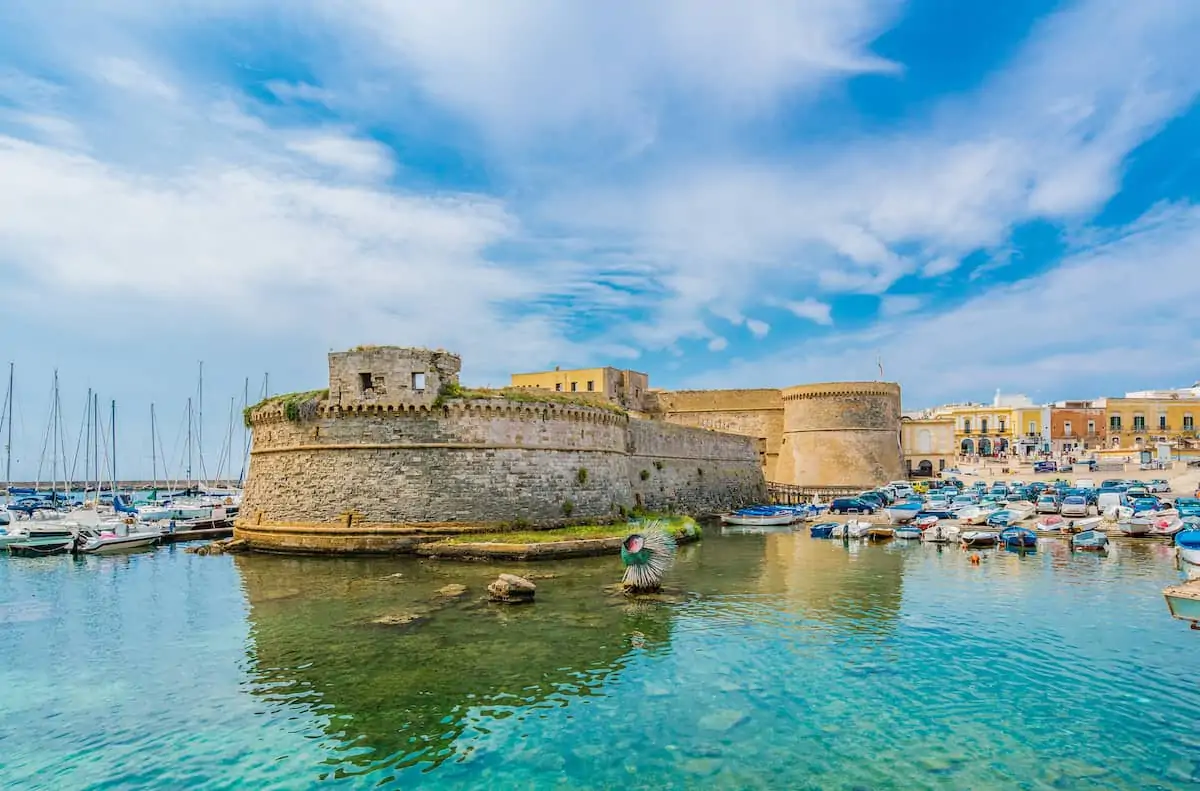
Over the past several years, I’ve explored both the Adriatic and Ionian coasts as well as many inland villages in Puglia. It’s one of my favourite places in Italy.
Not only does the Salento region have fantastic regional cuisine, a diverse history and stunning Baroque architecture, but it’s got some of the finest beaches I’ve ever seen.
Here’s why you should add this seaside city to your Apulia bucket list.
I’ve also included advice on hotels, the best things to do in Gallipoli, sights to see and regional specialties you definitely don’t want to miss.
🌟 Tip: Wondering how to pronounce Puglia? The pronunciation is “Pool-ya” and in Italian it’s Apulia.
1. Walk the Ancient Walls of Old Town
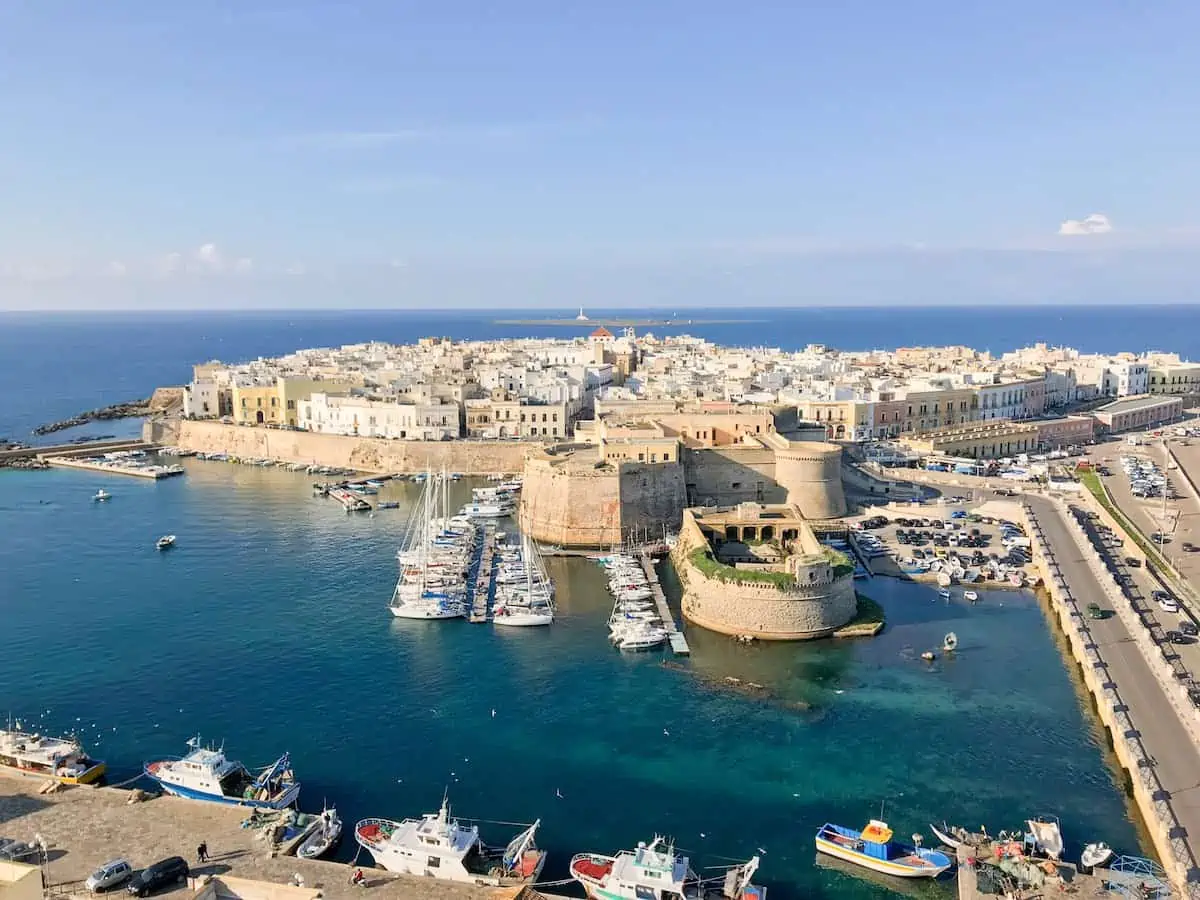
One of the first things to do in Gallipoli is get oriented to its old and new sections by taking a guided walking tour. The Old Town District of Gallipoli is a stark contrast from the more modern downtown centre.
It’s located on an island accessed from the mainland part of the city via a 17th-century bridge. This bridge is your first taste of the rich history and culture that dominates the fortified island.
The first thing you’ll notice is the impressive Gallipoli Castle and Rivellino Tower that loom over the harbour. The castle and 14th-century walls and fortifications that dominate the island were built for defensive purposes.
There’s no shortage of photo ops here! As you explore the narrow streets and walk the ancient walls, you’ll see architecture from many centuries.
🌟 Pro Tip: On a clear day, don’t miss the incredible views of Gallipoli Lighthouse in the distance.
Check prices and availability of this top-rated 2-hour Walking Tour of Gallipoli on Viator.com.
Looking for something more tailored? TravelLocal’s customized Italy vacations are a great way to explore Puglia with a local expert.
2. Visit the Greek Fountain
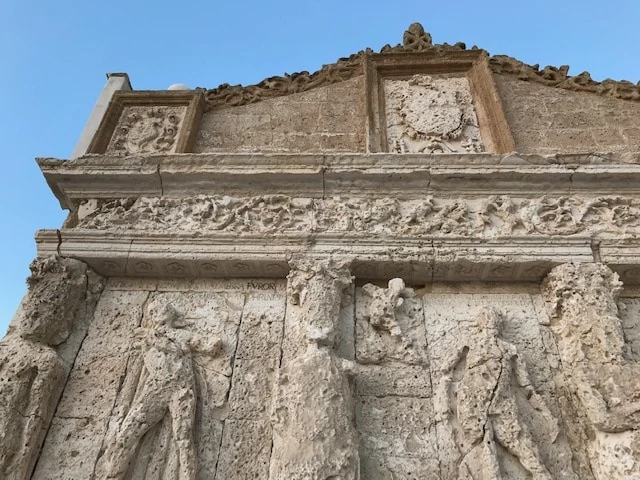
On your walking tour be sure to make a stop at the Greek Fountain. Gallipoli was founded by the Greeks and its original name of Kallipolli actually means “Beautiful City”.
The beautiful Fontana Greca is a reminder of this past.
Once thought to have been constructed in the 3rd century, recent findings show it was built centuries later. But it’s still a must-see attraction on any Gallipoli visit.
You don’t even need to go out of your way to find it! This stunning architectural wonder is a few minutes walk next to the bridge leading to the Old Town.
The Greek Fountain stands five metres tall and features a water basin and intricate designs.
🌟 Insider Tip: Take a peek inside the nearby Sanctuary of Santa Maria del Canneto a baroque-style church containing a stone statue of the Virgin Mary recovered from a fire in a previous church.
3. Get a History Lesson at the Gallipoli Castle Museum
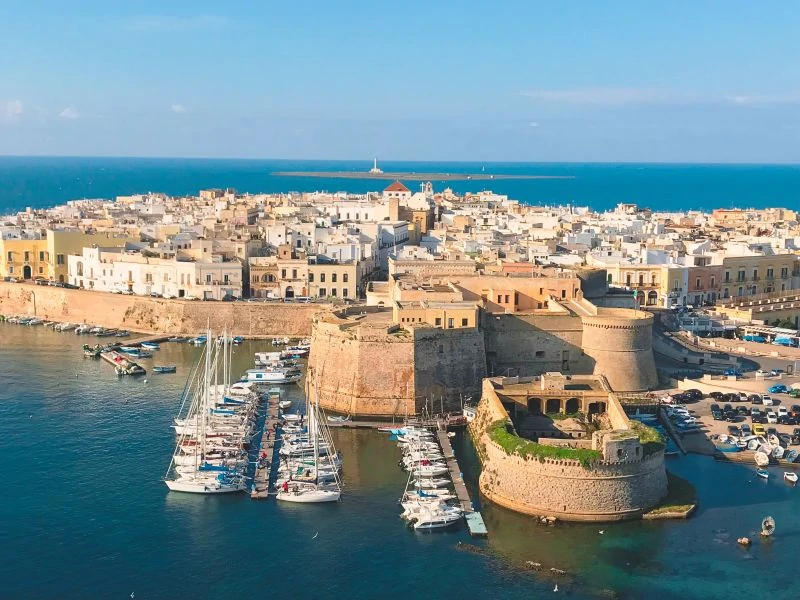
This region of Puglia has been invaded, conquered and populated by waves of Greeks, Romans, Ottomans, Spanish and Normans. Each left their mark on its traditions, architecture and landscape.
Gallipoli Castle was built in the 13th century and today, it houses a museum dedicated to the area’s history and culture.
This striking landmark towers over the harbour and features a display of modern artworks and exhibits showcasing ancient artefacts.
The theme of the museum is culture and civilization so it also plays host to contemporary art exhibitions and photography displays. The Torre del Rivellino (tower) is a popular and atmospheric venue for film, concerts and dance performance events.
Guided tours are available and a bookstore is on site. Admission to Castello di Gallipoli is 5€ per person. Hours vary seasonally.
4. Admire Saint Agatha Cathedral
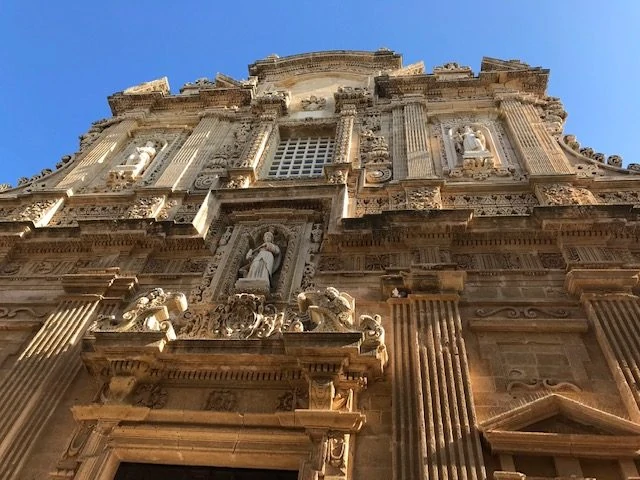
For me, one of the highlights of this beautiful city is the Gallipoli Cathedral, also known as Saint Agatha Cathedral. It’s a striking Baroque-style church that was finished in the late 1600s.
The exterior of local stone, a golden sandstone known as pietra carparo, is one of the best Gallipoli sights at sunset. But the interior, with its Byzantine and Renaissance features, really is a hidden gem.
Inside you’ll find a nave with marble pillars holding up an arcade and beautiful works of art created by local artists.
Some of the beautiful creations include The Holy Souls of the Purgatory by G.A. Coppola, the Martyrdom of St. Sebastian by N. Malinconico and The Miracle of St. Francis of Paola by G. A. Coppola.
5. Take a Refreshing Swim at Purity Beach
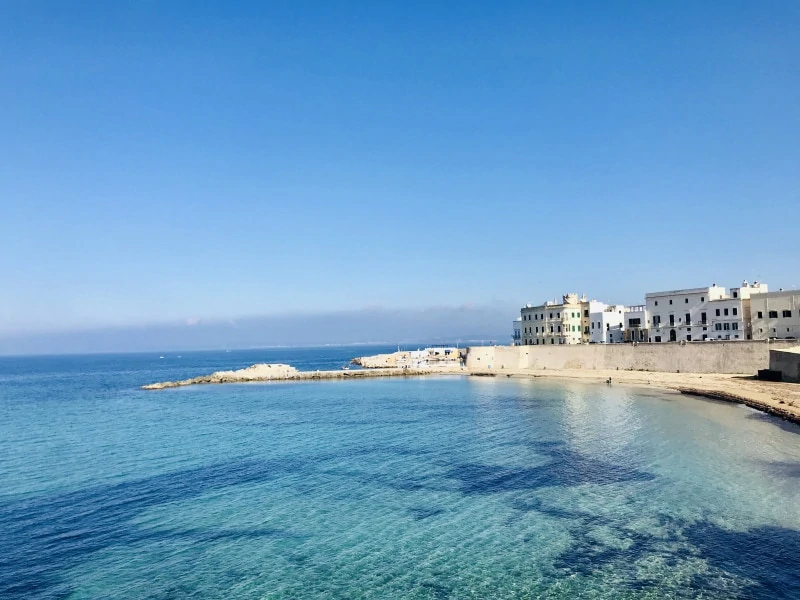
As the only beach in Gallipoli proper, Purity Beach is the perfect location to take a break from shopping and touring the city to cool off in the clear waters.
This scenic, sandy beach is located right below the historic walls of Old Town and minutes walk from shops, restaurants, and attractions. The beach is small, but rarely gets crowded.
It’s also quite shallow which means it’s safer than some of the other beaches in the region.
Unlike the beach clubs further south, there are no facilities at Purity Beach. But you also don’t have to pay a fee to access it.
One Day in Gallipoli
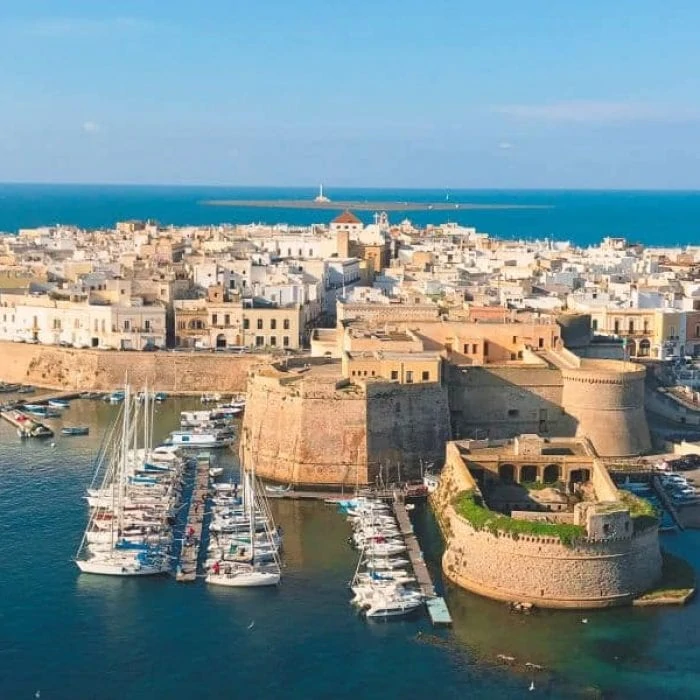
No time to spend more than a day in Gallipoli? Our top excursion is the Tour to 4 Picturesque Towns of Gallipoli, Otranto, Leuca and Galantina.
It gets fantastic reviews too!
6. Visit Gallipoli Fish Market
In this part of Salento, instead of tour groups, you’re more likely to see fishermen hauling nets brimming with fish plucked fresh from the Ionian Sea.
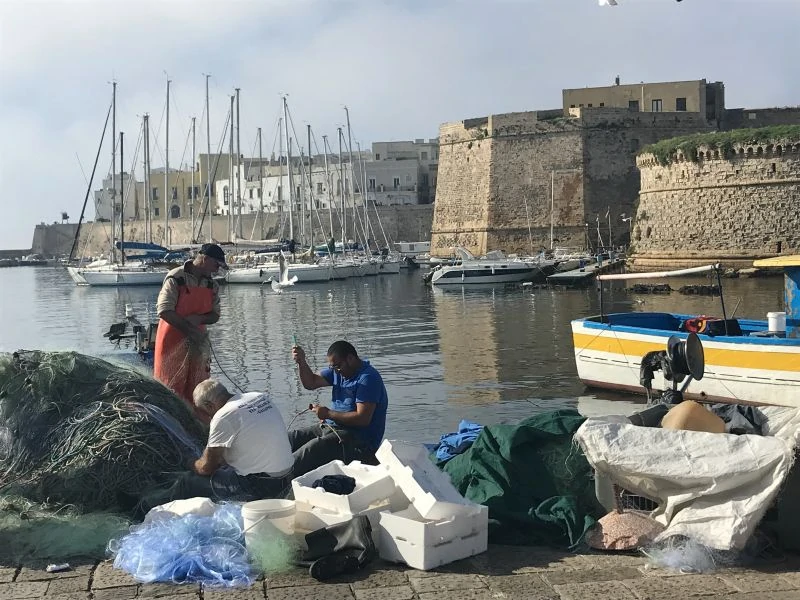
A top thing to do in Gallipoli is visit the Gallipoli Fish Market. Situated underneath the bridge leading to the Old Town District, it’s part market, part spectacle and part restaurant zone.
No matter what time of day you visit this fascinating place, there’s excitement in the air.
Very early in the morning you can watch the “paranze” (typical Gallipoli fishing boats) haul in their catch. Then, witness the long-standing tradition of the fish auction where customers shout and banter excitedly while competing for the best catch of the day.
Later, take a seat at an open air table and enjoy a fresh seafood dish matched with a glass of regional wine.
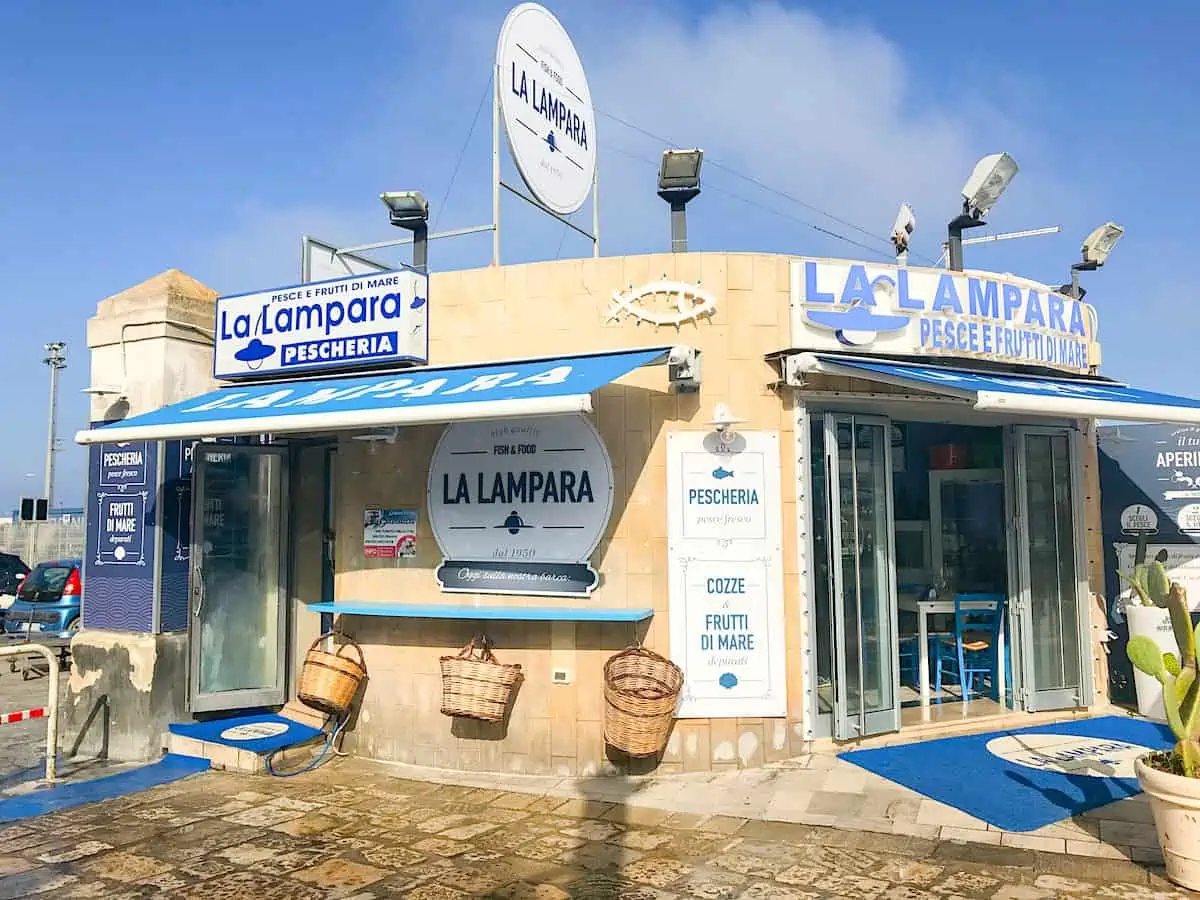
Some of the fresh-off-the-boat seafood you should try in the market:
- purple prawns of Gallipoli,
- scampi,
- local red oysters,
- white oysters,
- sea urchins and more, all sold by weight and prepared while you wait.
7. Sample Traditional Gallipoli Fish Soup
Italian fish soup is a favourite among seafood lovers around the world and varies in preparation depending on the region of Italy you’re in.
Typically, the dish is a mix of different types of fish served on a slice of bread saturated in tomato sauce and seasoned with chilli, garlic, and other spices.
In Gallipoli it’s raised to a fine art. Gallipoli fish soup is unique in that the soup is diluted with sea water and contains about 20 different fish.
You’ll find scorpion fish, capons, and stargazers as well as mussels, shrimp, and cuttlefish.
Looking for a restaurant in the city where you can sit down and enjoy a delicious serving of traditional Gallipoli fish soup?
Try L’Angolo Blu. Don’t forget to complement your meal with a glass of Salento wine.
8. Sip Local Wines
Italy has long been known for its wines and famed wine regions, but Salento is only recently emerging on the wine scene as a must-visit region.
One of the best places to explore the wines within the Unione dei Comuni Jonica-Salentina is during a day trip to the town of Melissano, named after the Greek word Melissos in reference to its honey production.
This sweet legacy can be seen in the honey bee depicted within the town’s crest.
Wine fans will be interested in the Unione Agricola di Melissano (Google Map), a cooperative producing Negroamaro, ruby red wine with rich black fruit flavours, as well as the medium bodied Primitivo, one of the most iconic wines of the Salento.
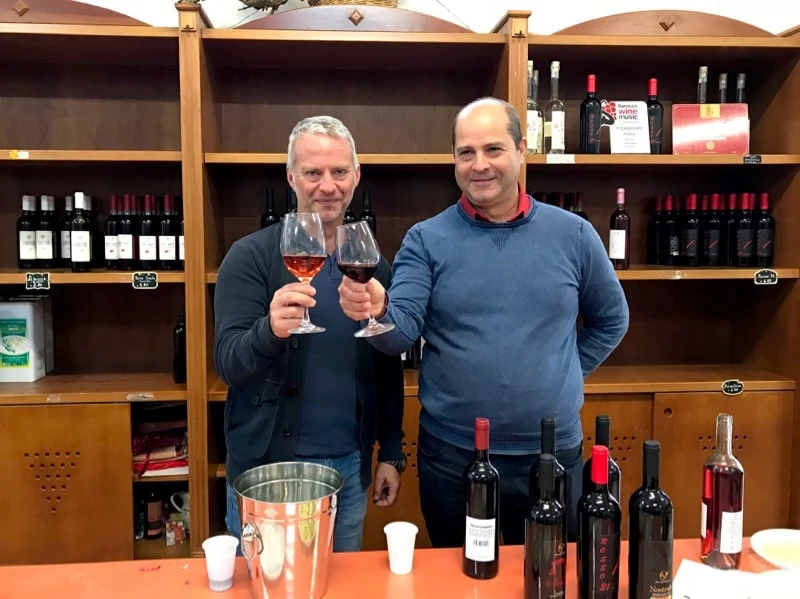
Many of the traditional wines produced here are made from the black-skinned Primitivo grape which creates very flavourful wines with hints of blackberry, dark chocolate, and liquorice.
Other popular varieties include Salice, Negroamaro, Salentino, Nera, Malvasia Bianca, Verdeca, Chardonnay, and Fiano.
Top wineries to visit for a tasting and a tour of the facilities and vineyards include Tenute Rubino, Mottura Vini Del Salento, Leone di Castris, Cantine Baron, Azienda Agricola Salvatore Magnoni, and Vetrere.
9. Admire Ancient Watchtowers Along Coastline
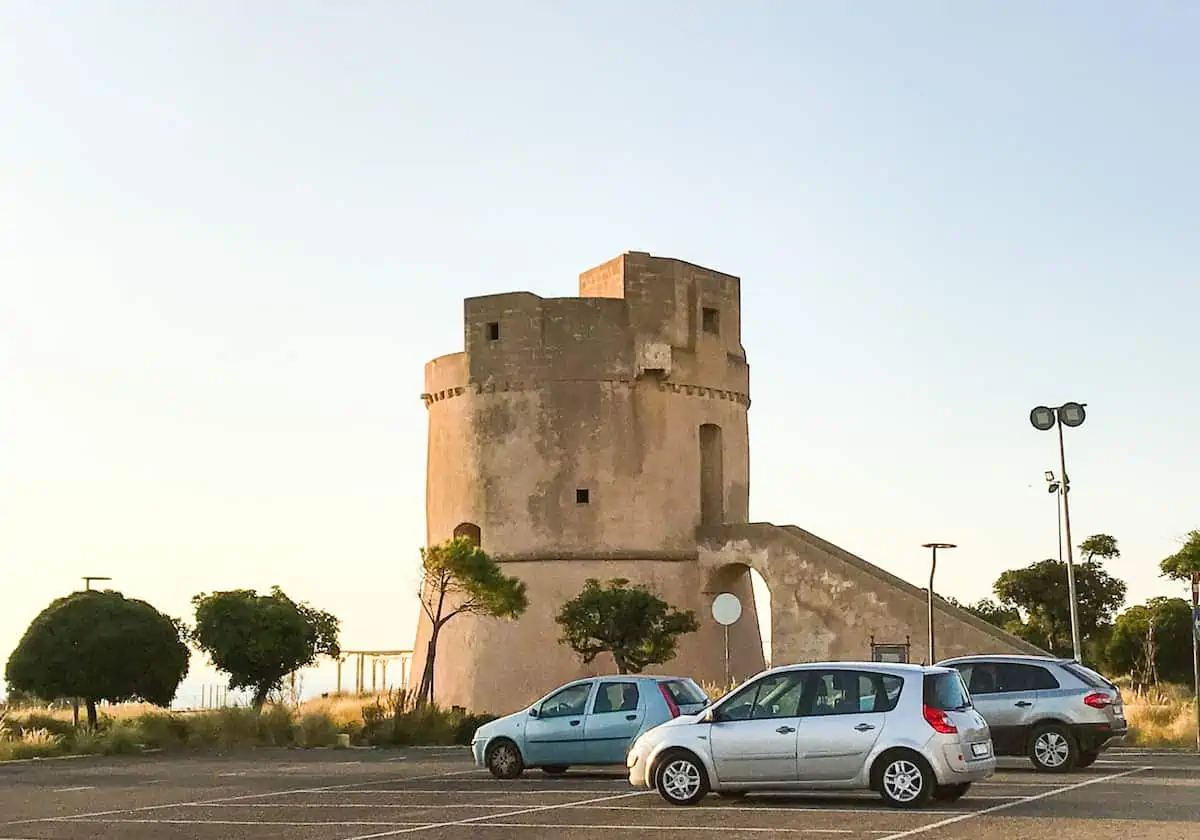
Gallipoli and its surrounding region have historically been the subject of countless attacks. The fortified watchtowers that dot the coast were built with defence purposes in mind.
While many of the towers are now in poor shape, their striking appearance against the contrasting beauty of the area makes for some great photo-ops.
If you’re planning a day trip, notable towers still standing today include the Torre Suda, Torre Alto Lido, Torre Sabea, Torre del Pizzo, and Torre San Giovanni la Pedata. The majority of the towers along this coast were built in the 16th and 17th centuries.
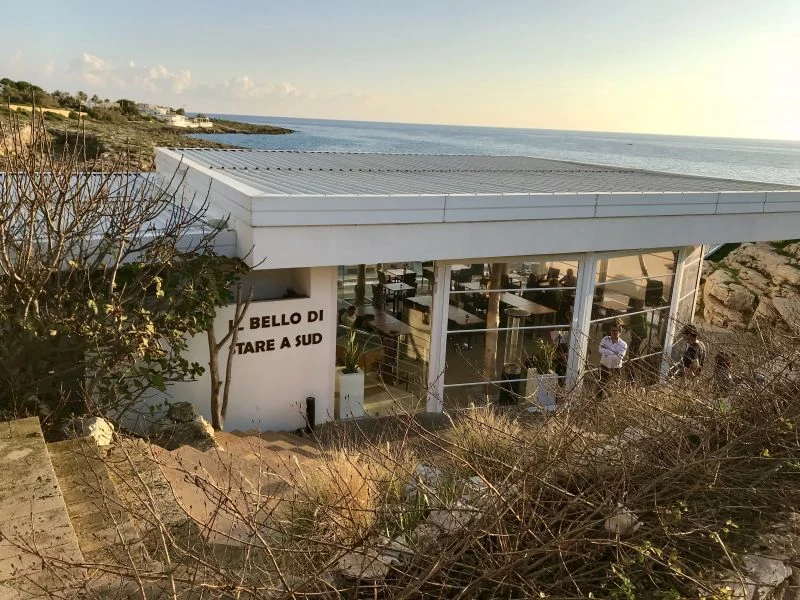
An outside table at stylish Solatio restaurant near Torre Suda is a prime place to soak up the views while dining on sweet shrimp simply grilled with olive oil, lemon and sea salt.
10. Enjoy a Gallipoli Beach Day
In Italy, a lido is a beach club where you pay a fee to spend a day on a private beach with privileged access to a range of services.
What you sacrifice in privacy, you gain in amenities. There will usually be a restaurant serving light food and cocktails, a scenic oceanfront terrace, sun loungers, change rooms, and showers.
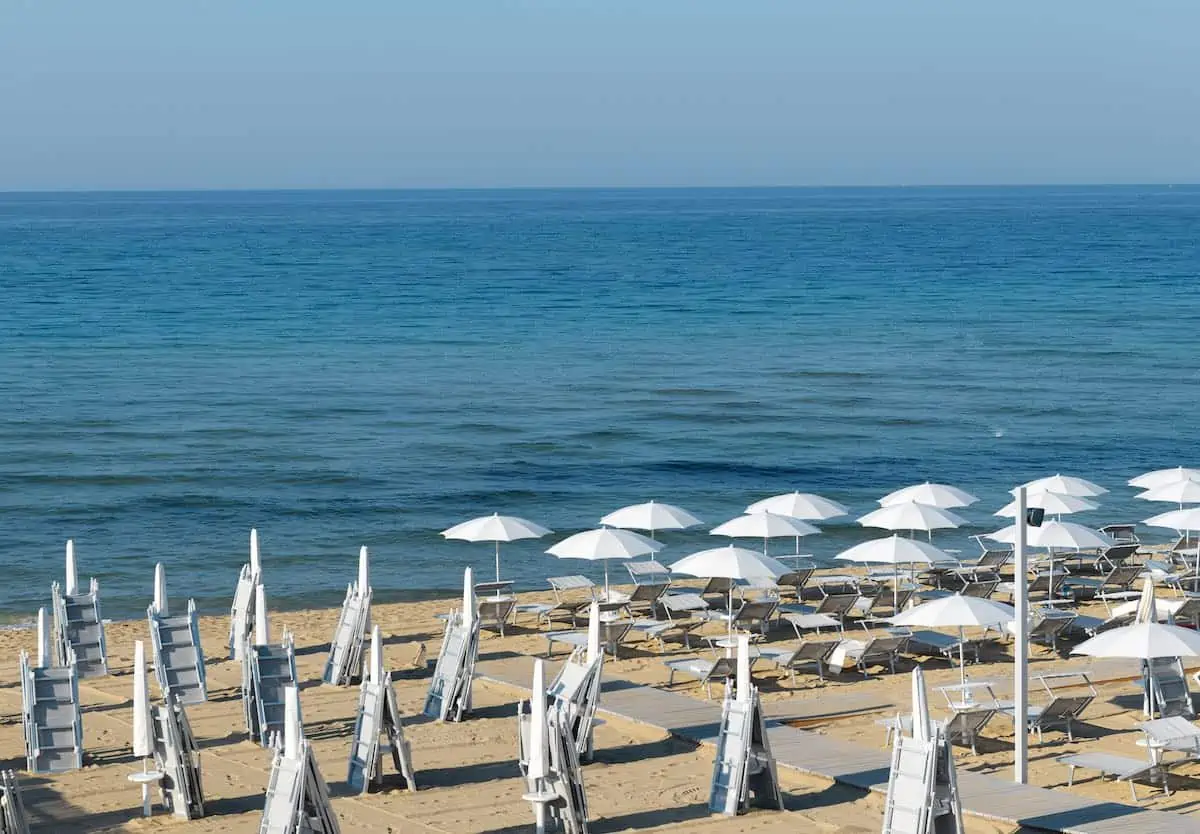
While there are several popular lidos on the Ionian Sea north of Gallipoli towards Taranto, many others are located to the south. One of the most well-known is Spiaggia G Beach.
Here you’ll enjoy a relaxed beach day with easy access to the crystal clear blue waters of the Ionian Sea. For partying, a popular destination is Samsara Beach, known for its DJs, live music and concerts.
Another option for a day trip on the Ionian sea is Baia Verde where there’s a mix of sand and rocky outcroppings.
No matter which of Gallipoli’s many beaches you choose, stick around until dusk and you’ll enjoy one of the spectacular sunsets the area is known for.
11. Explore Coastal Wonders with a Boat Tour
Several local companies offer boat tours in the waters surrounding Gallipoli, each offering different activities and stops at different sites.
But the two most popular activities for coastal excursions are snorkelling and cave exploring.
Both Sea Tour Gallipoli and AmareMare Tour offer boat cruises with snorkelling. During a snorkelling tour, you’ll enjoy crystal clear, calm waters making it easy to spot colourful fish.
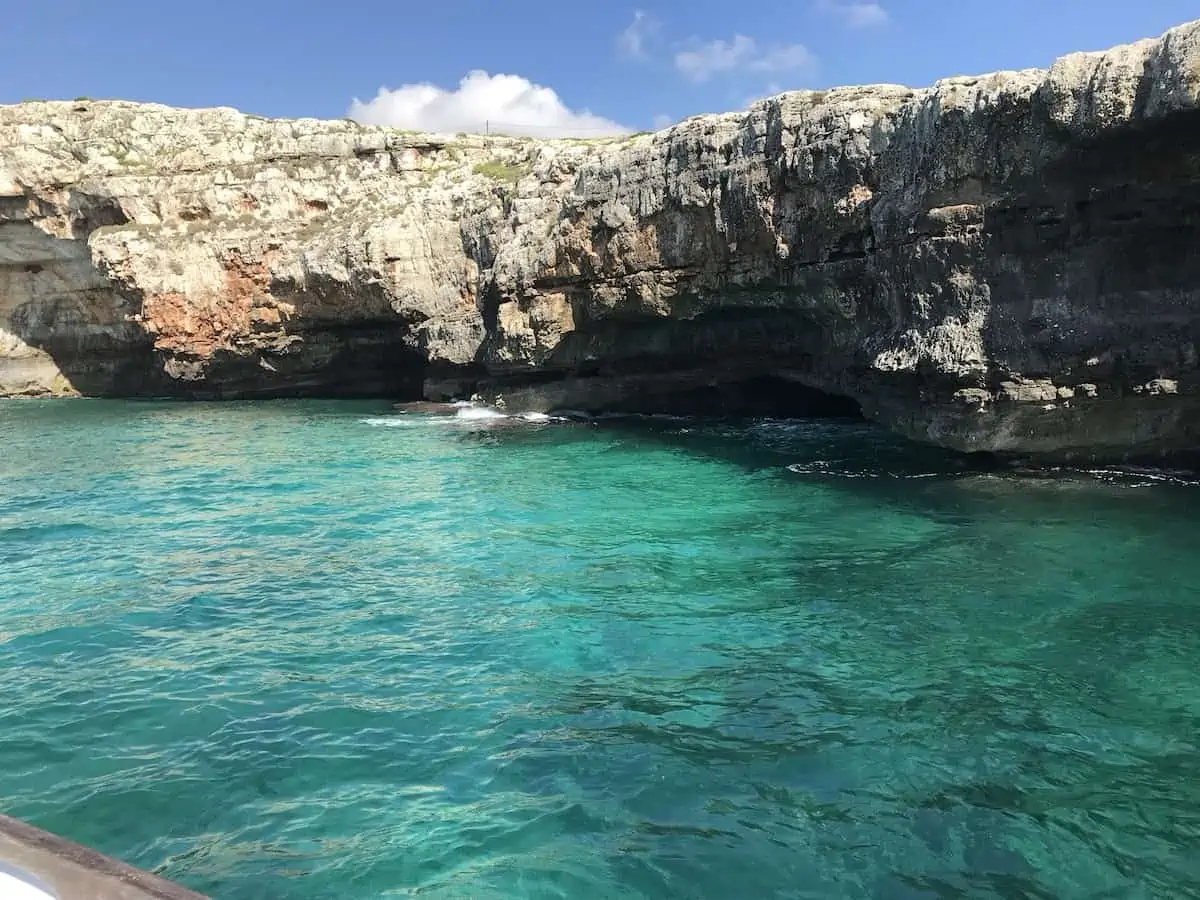
You may even get to see some of the region’s famous underwater caves.
Several boat tours go all the way south to the Caves of Santa Maria di Leuca which includes several incredible cave formations including the Cave of Terradico, Cave of the Soffio, Cave Verdusella, and Cave of the Vora.
One thing all Gallipoli boat excursions have in common are the unique views of the grottoes and coves carved into the cliffs along the coast. On these mini-cruises, you can often also jump in and swim in the pristine clear waters.
Be sure to book in advance!
Check prices and availability of this top-rated Boat Excursion on the Ionian Coast on Viator.com.
12. Party at Gallipoli Nightlife
Parco Gondar is a massive entertainment complex situated in a central location on Gallipoli’s seafront.
On most nights, the on-site live music pub Welcome to Tijuana is the place to be. This is where you can enjoy a party atmosphere with live local music.
You’ll also have access to a pizzeria and a games room with table tennis, carambola, and pinball machines. Throughout the year, a variety of concerts, sporting events, and other large-scale events take place at the arena.
It’s well worth checking Parco Gondar schedule to see what’s happening during your visit. Another top spot is Samsara Beach.
Check their Facebook page for a schedule of events.
13. Day Trip to the Village of Racale
An ideal itinerary for the Salento Peninsula should also include day trips to the Unione dei Comuni Jonica-Salentina a collection of five tiny villages within easy driving distance of Gallipoli.
A 20 minute drive south of Gallipoli, the charming village of Racale is the type of place where it doesn’t take long to begin wondering about the price of real estate.
It’s easy to imagine oneself cycling to the market, sipping a caffè macchiato or cappuccino in one of the many streetside cafe/bars or hanging laundry on a light-flooded rooftop of a 17th century building.
This small, inland village brims with unassuming genuineness; its cobbled streets empty except for cascading flowers and palazzos waiting for a breath of new life.
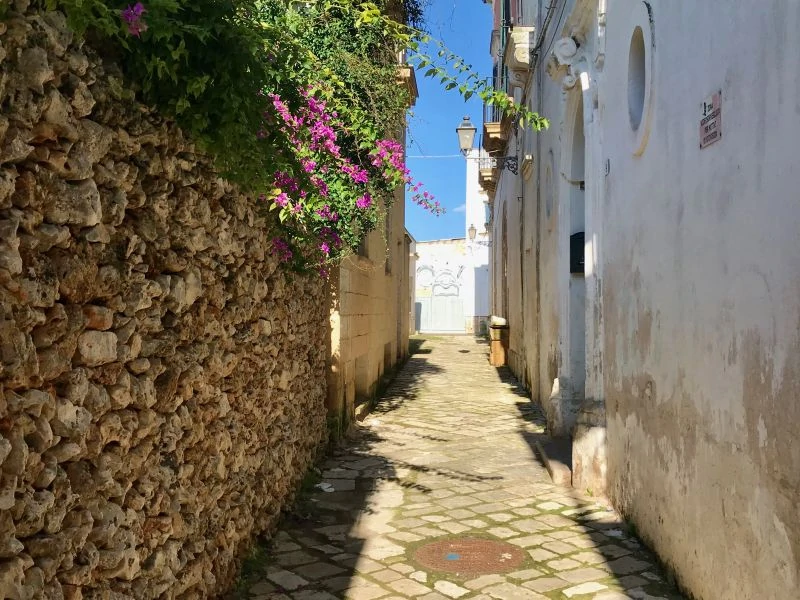
In addition to a rich history evident from the she-wolf of Rome emblems on its fountains, ancient city gates and 600-year old stone walls, the town of Racale is also a short drive to soft golden sand beaches stretching northward to Gallipoli.
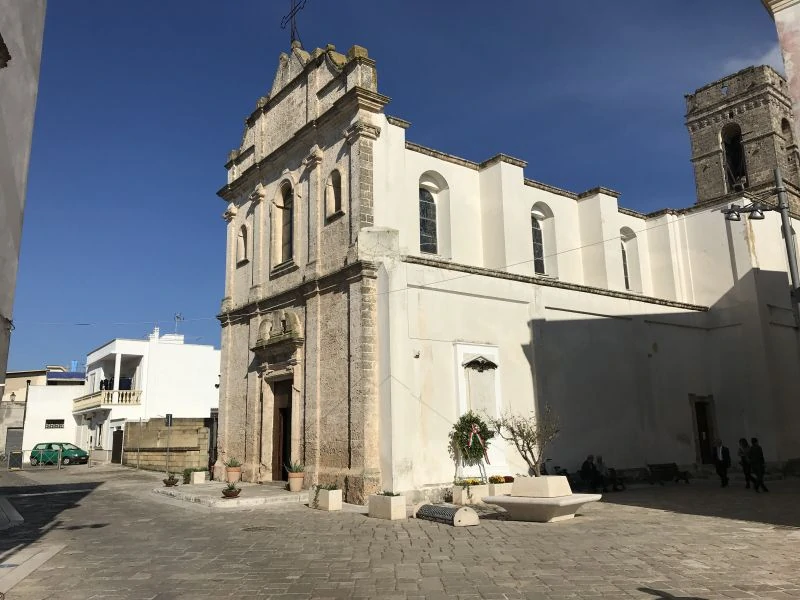
Fringed by a national park filled with fragrant Aleppo pine, the windswept dunes and azure waters are assuredly some of Italy’s most scenic.
It’s also proving to be a popular retirement destination in Italy. With real estate said to be half the price of Tuscany, Racale also features outdoor markets filled with fresh produce, antipasti and local cheese.
The surrounding countryside is dotted with wild flowers, cactus, ancient gnarled olive trees and even more frantoi ipogei in various states of restoration.
The easiest way to get around Salento is to rent a car.
We rent our cars on Discovercars.com. It’s an online car rental booking site that compares rates from several companies to find the best deal.
Check for the best car rental rates at Discovercars.com
14. Dine in an Underground Olive Oil Mill
An unforgettable thing to do in Gallipoli is to sample local wines and authentic regional dishes within one of the more than 100 underground olive oil mills in the region.
Ancient underground olive presses dot the landscape of Salento.
A top one to try is located at La Grottella restaurant (Google Map) on the outskirts of Melissano, a unique pizzeria and trattoria with its own underground facility.
At La Grotella, the ancient frantoi ipogei with its oil presses has been carefully restored. Originally, the underground facilities protected the olives from the scorching heat as well as from theft.
I was surprised to learn that olive oil was not only enjoyed as the deliciously healthy oil we know today but was once used for heating and lighting in the lamps throughout Europe.
Check prices and availability of a 5-Day Tour of Salento (includes a Gallipoli boat excursion and an underground olive mill experience) on Viator.com.
15. Experience a Local Festival
Italians know how to do summer right. And in Gallipoli, that means timing your trip with the Feast of Santa Cristina in late July.
It honours the patron saint who saved the city from a cholera epidemic and features the famous Salento illuminations, fireworks, a procession of the statue to the water, live music and just the right amount of revelry.
In autumn, the nearby town of Taviano hosts the Festival de San Martino (St. Martin of Tours).
This harvest celebration recognizes the patron saint of winemaking, horsemen and horses, beggars, the poor and injured.
San Martino is often depicted on horseback, sharing his cloak with a beggar.
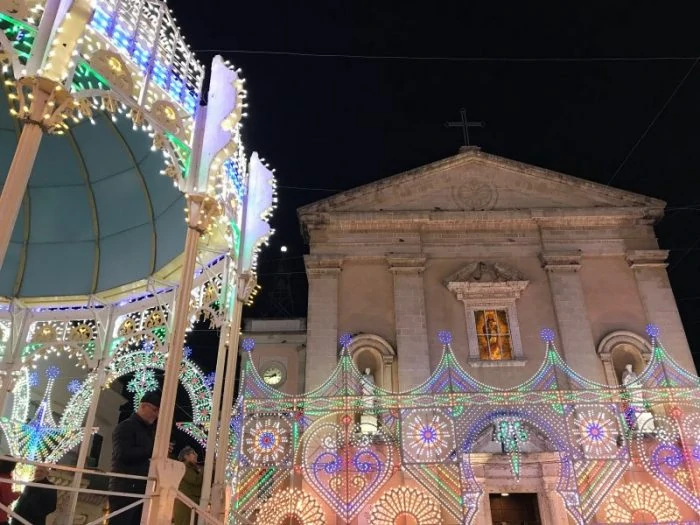
His feast day is November 11th but the festivities take place on November 10th.
They include the illumination of the streets of the town, processions featuring the statue of the St. Martin being carried from the church through the streets along with brass bands, live music and dance.
And of course there’s food!
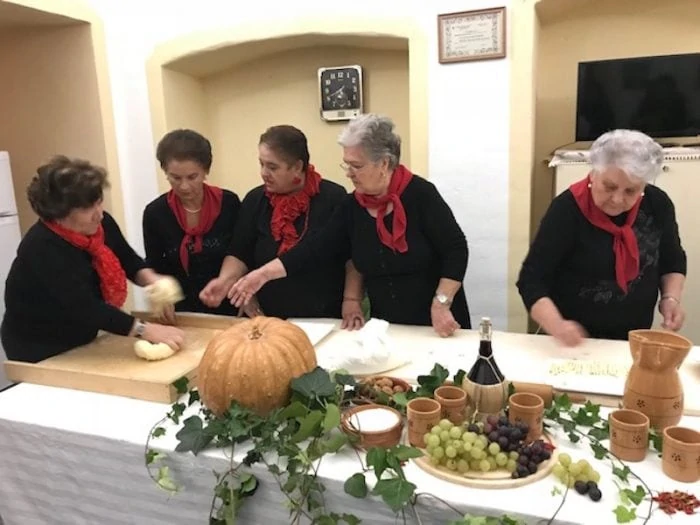
Another top festival is the Novello in Festa – New Wine Festival in November. It takes place in Leverano, north of Gallipoli.
The festival is an opportunity to sample vino novello (new wine of the season) and explore the impressive Torre Federiciana, a structure dating to 1220.
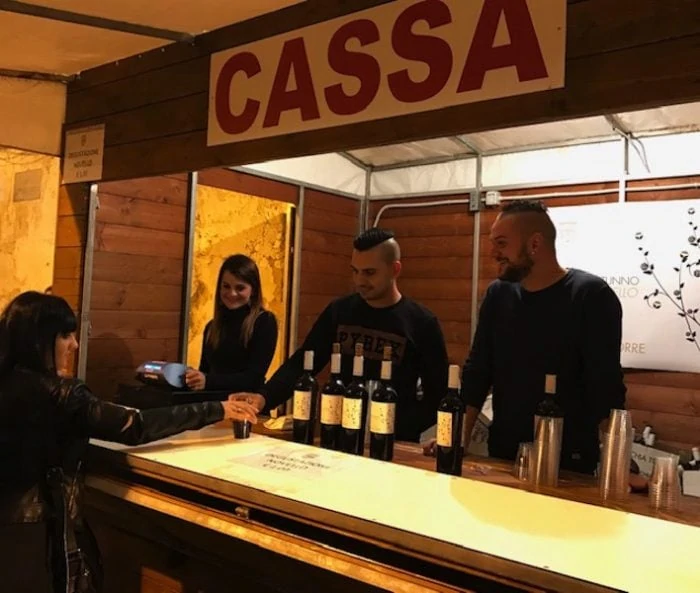
🌟 Pro Tip: If you miss the Novello in Festa (New Wine Festival in November), aim for the summer Medieval Festival.
16. Feast on Regional Cuisine
When it comes to gastronomy, in addition to celebrating with vino novello (new wine of the season) and castagne (chestnuts), food fans will enjoy sampling an array of delicious regional cuisine.
As you explore other inland towns in Salento, you’ll meet vendors in markets, restaurant chefs as well as artisanal producers, all willing to share their stories and cuisine.
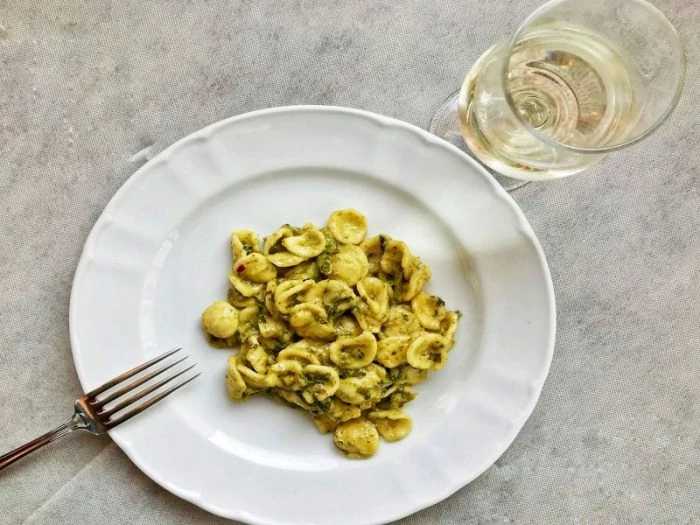
The cucina povera tradition means the cuisine is simple and delicious, relying on fresh, local produce.
One of the most famous dishes of Italy’s 20 best food regions is orecchiette cime di rapa, an ear-shaped pasta originating in Puglia, served with rapini.
Another regional dish popular throughout Salento — Purè di fave con cicoria or Fava Bean Purée with Chicory— had me swooning at first bite.
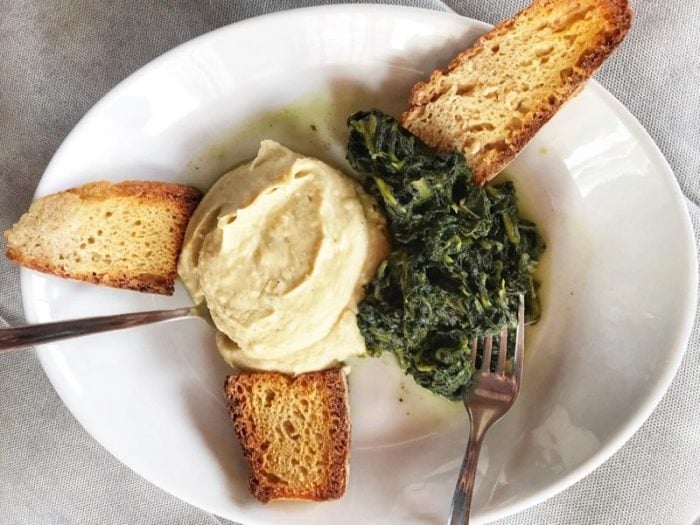
Perfect in its simplicity, much like other cucina povera style recipes of Puglia, it’s a marriage of creamy fava beans complemented by slightly bitter chicory.
17. Sample Salentine Street Food
Also worth seeking out are the unique street foods such as Scapece Gallipolina, tiny fish such as fried smelt marinated in vinegar, olive oil, saffron and grated breadcrumbs.
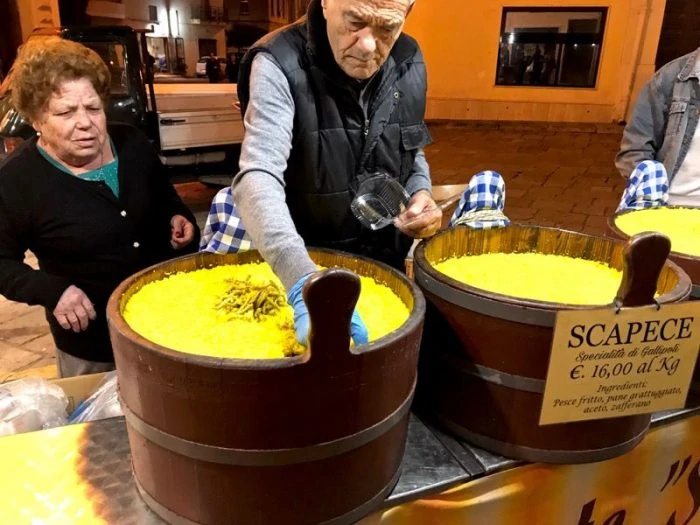
Produced by a small number of families, who themselves are descended from generations of scapeciari dating back to possibly even Roman time, scapece is sold exclusively in markets and during festivals in the Salento region.
Look for enormous wooden barrels and order a serving by weight from the vendor for a few euros. The dish reminded me of fish escabeche in Spain and Latin America.
For me, scapece would be an acquired taste.
18. Do an Olive Oil Tasting
Another top thing to do in Gallipoli is learn about extra-virgin olive oil production of ulivi secolari, centuries-old olive trees.
For a tutored tasting, visit the Adamo Estate in Alliste where they cultivate olives without pesticides or fertilizers.
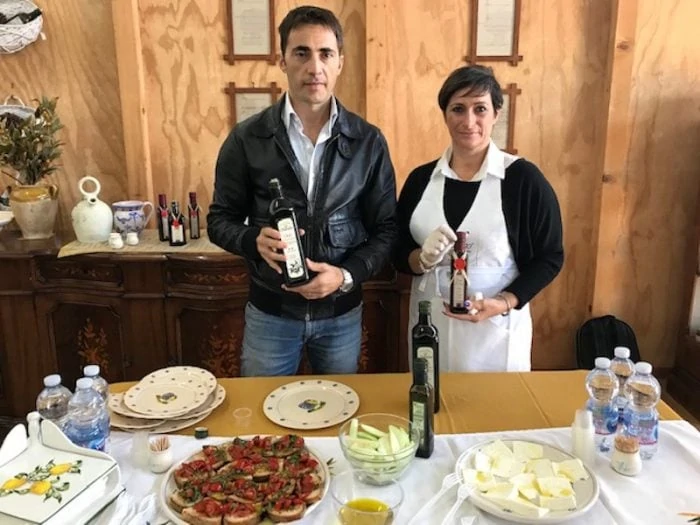
The prized olives are harvested in early October and then crushed using a traditional mill, thus preserving their quality and fruity flavour.
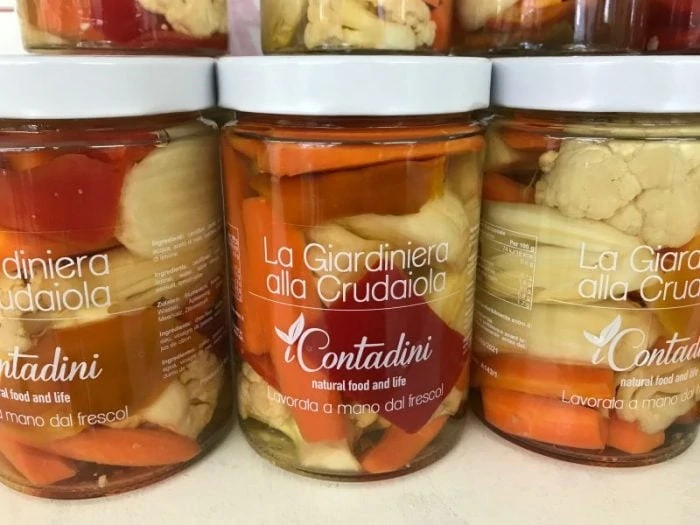
Another must-do on any Salento itinerary is the pastoral Contadini farm in Felline where you can sample an award-winning line of products such as sun-dried tomatoes, marinated vegetables and oils in a rainbow of colours.
Don’t miss lunch at a seafood restaurant such as Trattoria Octopus in Alliste. Here, the antipasti include polpette di polpo followed by catch of the day, baked in a sea salt crust, a regional cooking method that deliciously preserves the freshness of the fish.
19. Dance the Pizzica
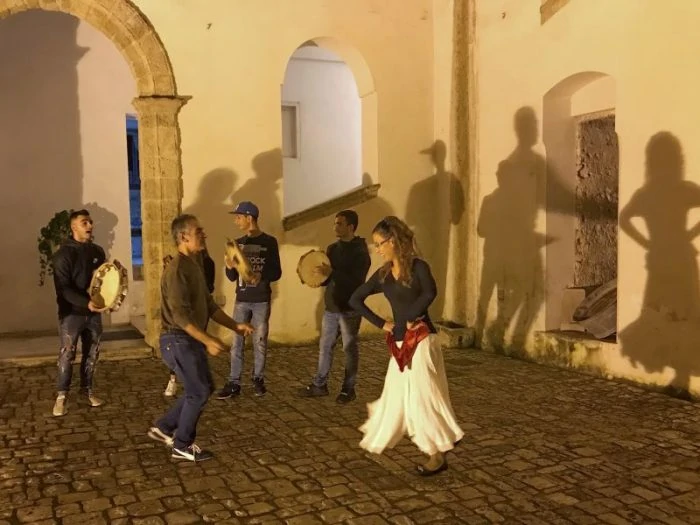
During your visit to Gallipoli, you’ll likely have an opportunity to witness the traditional folk dance the pizzica. You can even take a pizzica dance class!
While it has its origins in the Tarantella dance (a frenzied dance said to have been performed by victims of those bitten by a tarantula in order to sweat out the effects of the venom) the pizzica is a more elegant, romantic dance.
It’s often performed on the street by a couple accompanied by a guitar, a mandolin, an accordion and tambourines or more simply by tambourines and chanting.
Even Madonna danced the pizzica while in the Salento on vacation – so don’t be shy!
Check prices and availability of a pizzica dance lesson in Matino on Viator.com.
20. Browse Art in Matino
Wrap up your explorations in Matino, a charming village of winding streets, courtyards and stacked stone houses known as casa in corte, many of which have been converted into stylish B&Bs.
Although Matino is filled with fairytale, white-washed buildings and historic frescoes, it has a youthful energy and creative spirit.
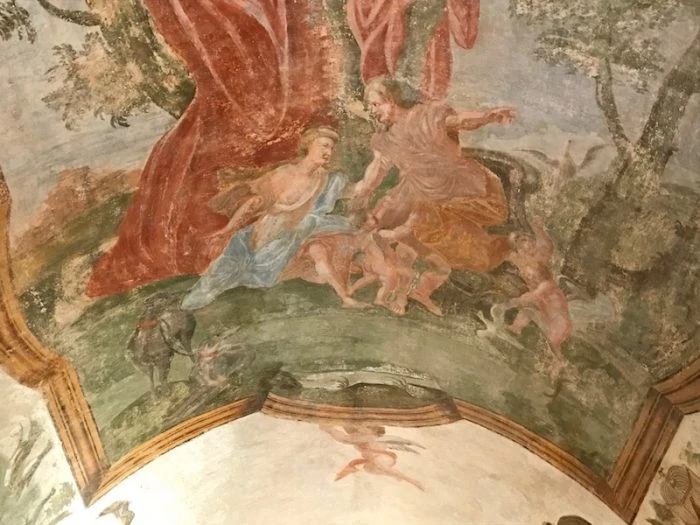
Located within the historic Palazzo Marchesale, its modern Museo Arte Contemporanea Matino is home to an expansive collection of contemporary art well worth exploring.
21. Sip an Aperitivo at Sunset
Wrap up your day with sunset sips at a bar or restaurant overlooking the Ionian sea. We often head to Il Faro Sunset Bar located on Gallipoli’s seaward balcony.
It pairs stunning Ionian views with regional cocktails and seafood bites for that quintessential golden-hour moment.
Best Time of Year to Visit Gallipoli
Despite word spreading about Puglia and this enchanting “heel” of Italy’s boot (Madonna and Helen Mirren are already fans), it’s still under the radar for mainstream tourists.
Outside of holiday periods when Italians flock to the beaches from Rome, Gallipoli is generally free of crowds in the shoulder seasons of April to May and September to November.
When it comes to weather in Puglia, June, July and August are the driest months but are also the busiest.
December and January can actually be chilly with daytime highs of just 13-15 C and overnight lows of 7 C. Ideal months to visit Puglia are May or September.
The city of Gallipoli is in Italy. It is situated facing the Ionian sea in Italy’s Puglia region. It’s within the Salento area which is comprised of Lecce and the southern parts of the provinces of Brindisi and Taranto.
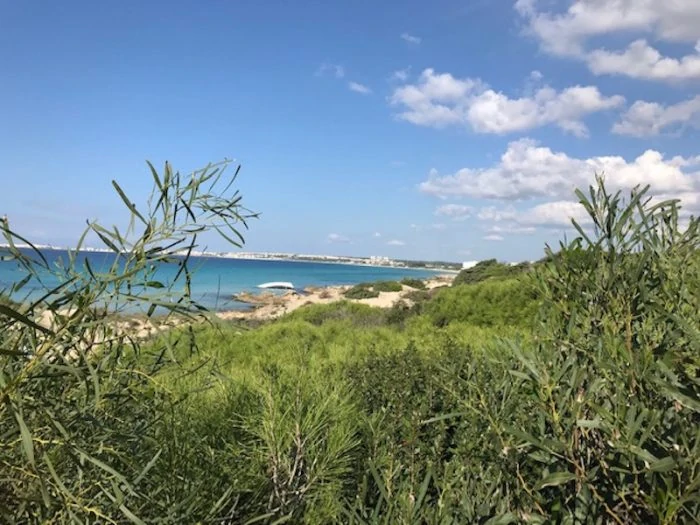
How to Get to Gallipoli from Brindisi
You’ll likely arrive as I did in Brindisi, on the peninsula’s northeastern coast, home to the Brindisi International Airport (BDS). It’s a 45 minute drive from Brindisi to Gallipoli.
Rent a Car in Brindisi
To get the best deal on your car rental in Puglia, compare rates and reserve online at Discovercars.com an online car rental website that features major providers such as Hertz, Eurocar, Alamo etc. with no hidden fees.
Check for the best car rental rates at Discovercars.com
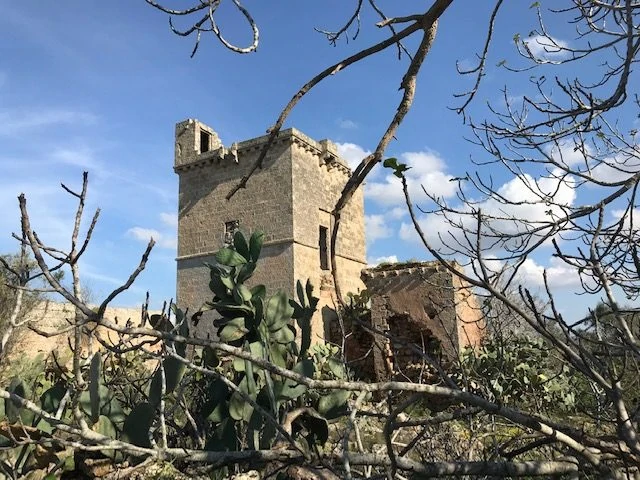
South of Brindisi is Lecce, the capital of the province of Lecce.
This beautiful city has been called the “Florence of the South” so try to spend some time taking cooking classes or studying Italian at one of its many schools.
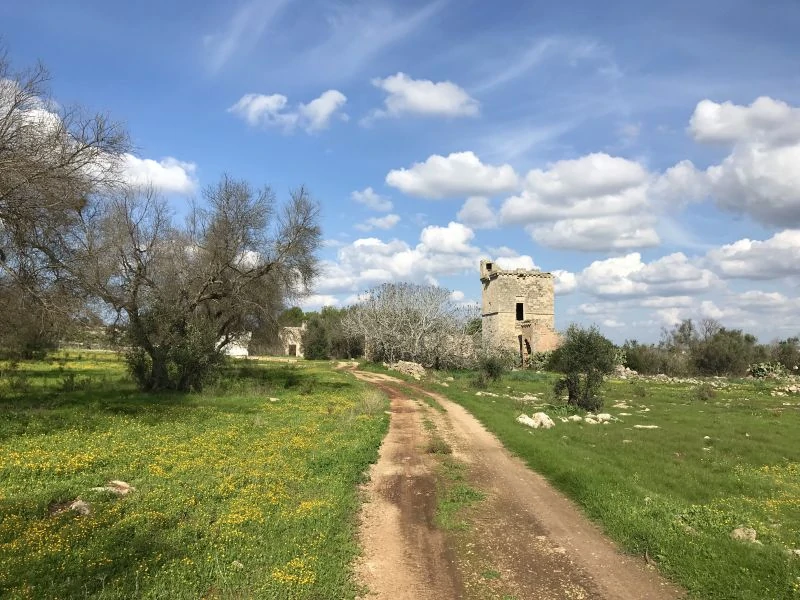
Transfer from Brindisi to Gallipoli
The most convenient way to get from Brindisi to Gallipoli is by private transfer.
You’ll be picked up in an air-conditioned vehicle by an experienced driver and dropped off directly at your hotel in Gallipoli.
Check rates and availability of a private transfer from Brindisi to Gallipoli on Viator.com.
Tours to Gallipoli from Lecce and Bari
If you’re based in Lecce, another option is to take a tour to Gallipoli. There are several types of tours available.
The most popular tour is the Tour of Four Picturesque Salento Towns. It includes visits to Otranto, Santa Maria di Leuca, Gallipoli and Galatina as well as panoramic looks at the pretty villages of Santa Cesarea Terme and Castro.
Check rates and availability of a Tour to Otranto, Santa Maria di Leuca, Gallipoli and Galatina on Viator.com
Best Places to Stay in Gallipoli, Italy
Hotel Palazzo del Corso – Luxury Hotel in Gallipoli

This boutique luxury hotel offers 5 star luxury with a rooftop terrace, restaurant and charming rooms with loads of personality in two historic buildings. You’ll love the frescoed ceilings, white marble and Lecce stone in this newly renovated 19th century building.
Hotel Palazzo del Corso is located off the main road (Google Map) and within easy walking distance to Old Town Gallipoli.
Check rates and availability of Hotel Palazzo del Corso on Booking.com.
Palazzo Daniele Hotel and Villa – Luxury Hotel in Gagliano del Capo
With their frescoed walls, open air courtyards and leafy gardens, an Italian palazzo is an unforgettable place to stay in southern Puglia.
One of my favourites is Palazzo Daniele a 9-room luxury boutique hotel located in Gagliano del Capo. Although it’s a 30 minute drive from Gallipoli, it’s close to the seaside town of Santa Maria di Leuca and its fabulous beaches.
Built in 1861 and set among ancient olive groves, this dreamy stay features ornate frescoes, mosaic flooring and a contemporary art collection as well as acclaimed dining.
Ultra-romantic, it’s a top choice for couples.
Check rates and availability of Palazzo Daniele on Booking.com.
Budget AirBnB
If you’re accustomed to the steep prices in other regions of Italy, you’ll be pleased to discover that prices are as low as 35 Euros a night ranging to a high of 100 Euros in the small AirBnBs and apartments.
The largest selection of these historic homes converted to accommodation for visitors is in Matino where you can find B&B Corte Dragone with three apartments at very low rates.
Check prices and availability of B&B Corte Dragone Matino on Booking.com.
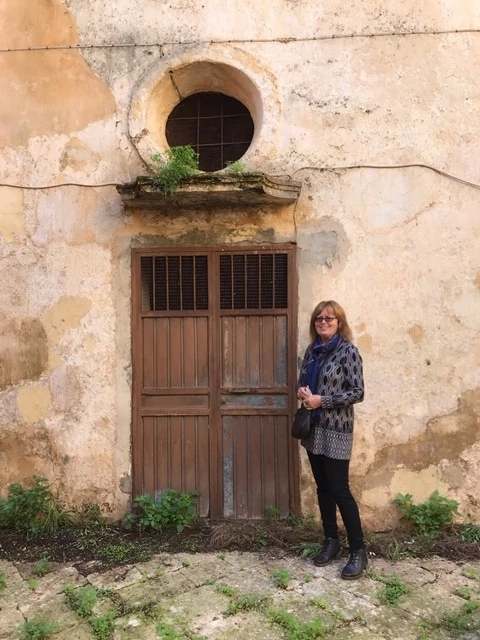
Bellavista Club – Budget/Mid-Range Hotel in Gallipoli
The Bellavista Club, a member of the Caroli Hotels Collection, is an affordable hotel in Gallipoli. with a prime location at the entrance to Old Town.
While the large, modern hotel has some advantages, namely spectacular views and an English-speaking, helpful staff, the guest rooms could use refreshing.
It’s good for groups and families as some guest rooms can accommodate several people.
Check prices and availability on the Bellavista Club-Caroli Hotels in Gallipoli on Booking.com.
Overnight in Rome: If you’re staying in Rome enroute to Puglia, it’s worth staying near the Stazione Centrale Roma Termini for easy access to the train station.
Check out my Guide to Rome’s Termini Neighbourhood for tips on where to stay, what to eat and things to do.
For a unique stay in Puglia, check out our guide to Booking a Convent Stay in Italy
Map of Salento Puglia
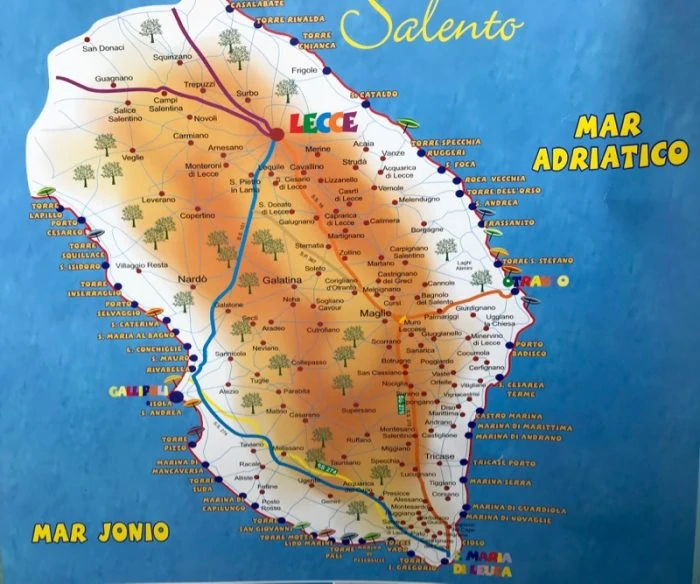
Official Puglia Website: www.viaggiareinpuglia.it
Official Unione dei Comuni Jonica-Salentina website: A collection of five small villages filled with charm. www.unioneionicasalentina.it
Getting To Brindisi: Fly to Rome and then connect to Brindisi via Alitalia or by train in five hours. Travel from Rome to Brindisi by rail in around three hours. It’s also possible to take the ferry from Greece to Brindisi.
Getting to Gallipoli: Gallipoli is connected to Lecce and Brindisi via the Ferrovie del Sud Est train and bus line.
Other Places We Love in Italy
FAQs
Both Otranto and Gallipoli are rich in history, with interesting churches and seaside promenades. Gallipoli’s beaches are superior to those in Otranto as its coastline features soft sand and calm clear waters. While Otranto, on the Adriatic, is dramatic with its steep cliffs and rocky coves, it’s not as famous for its beaches.
The city of Gallipoli is in Italy. It is situated facing the Ionian sea in Italy’s Puglia region. It’s within the Salento area which is comprised of Lecce and the southern parts of the provinces of Brindisi and Taranto.
Gallipoli, Italy should not be confused with the battle of Gallipoli. The latter was one of the bloodiest conflicts in the First World War. It took place on the Gallipoli peninsula (Gelibolu in modern day) of Turkey between February 17, 1915 to January 9, 1916.
While Gallipoli is served by the Ferrovie del Sud East train and bus line, the best way to get to the best beaches and inland towns is to rent a car. Gallipoli itself is compact and walkable.
Two days is enough to see Gallipoli’s major attractions. But five days in Gallipoli will give you enough time to relax on its beautiful beaches, take a day trip to sample the wine and olive oil of the Salento Region and take a boat tour along the Ionian coastline.
Save to Pinterest!
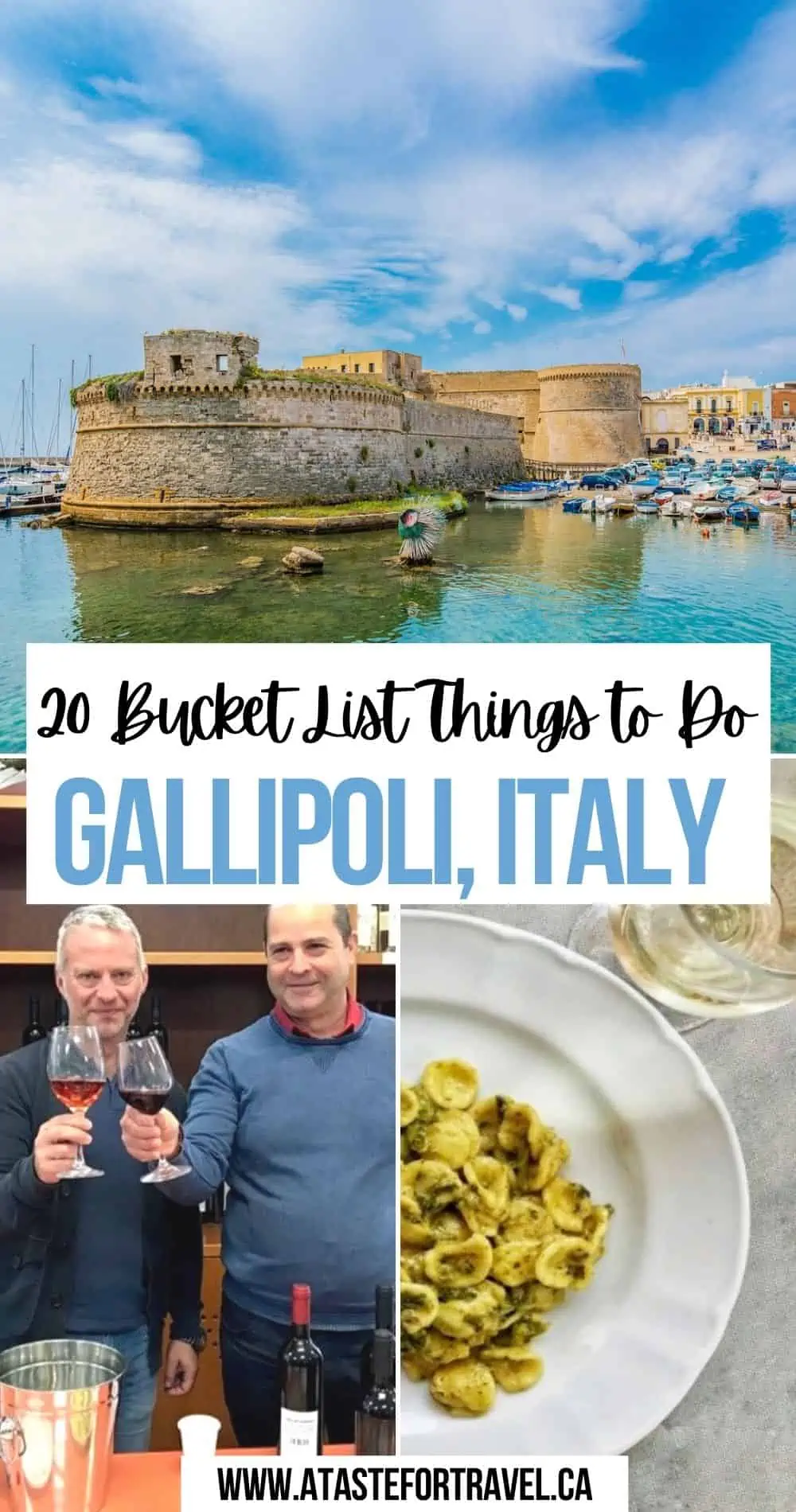
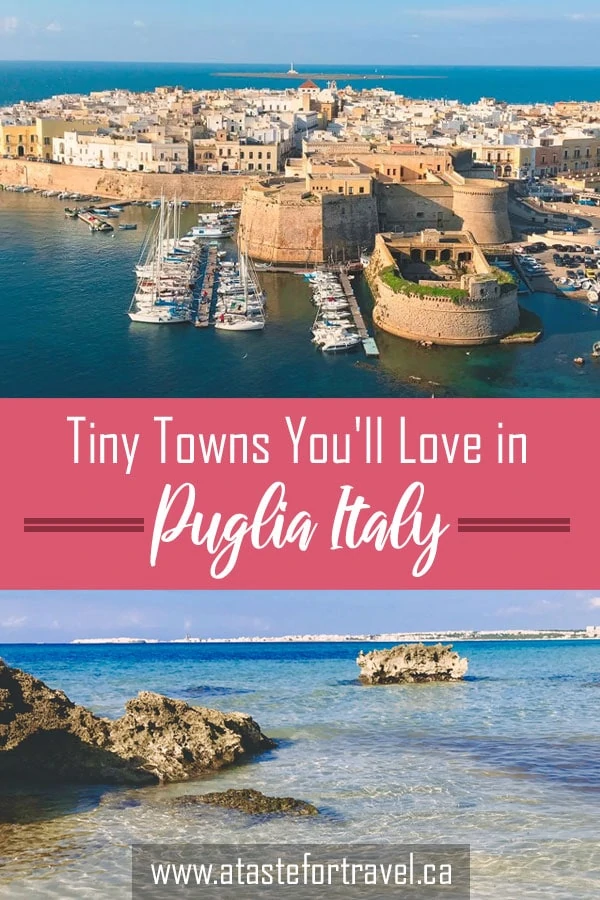

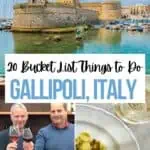
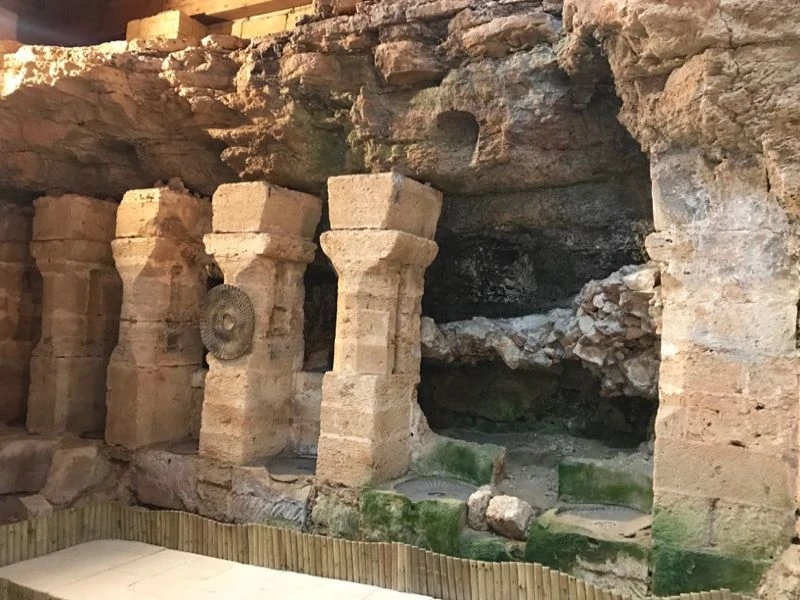
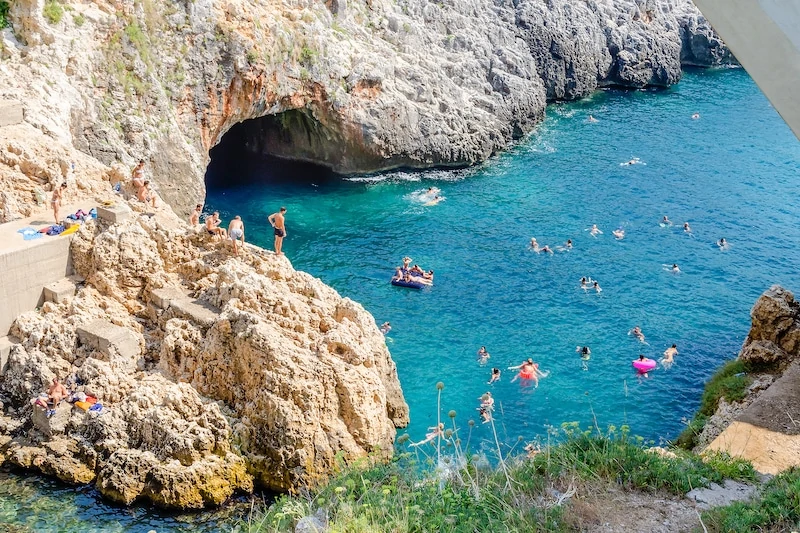
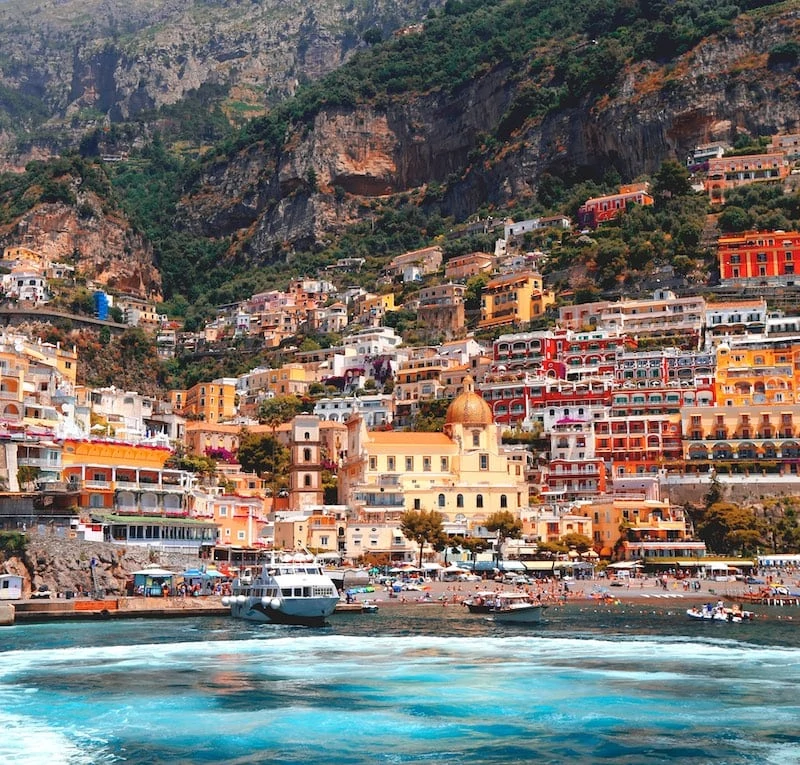
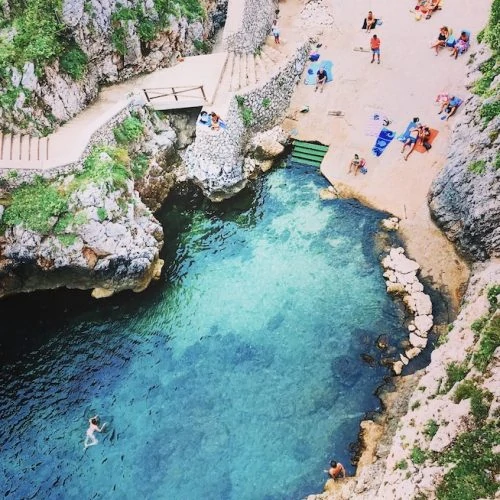
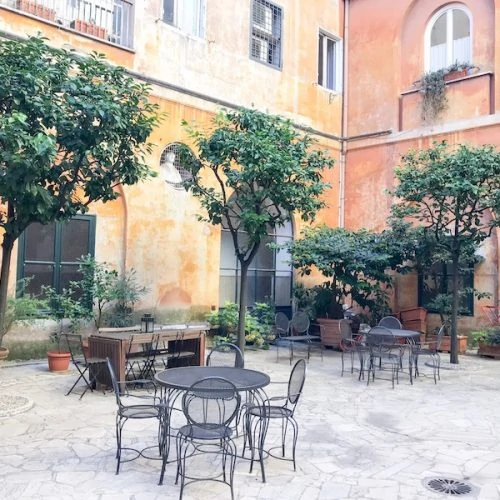
 Shirley Heights Antigua – A Guide to the Caribbean’s Best Party
Shirley Heights Antigua – A Guide to the Caribbean’s Best Party
Aparna verma
Great place Puglia is, Thanks for sharing such an amazing post and so beautiful images.
Feeling like to go there as soon as possible.
Keep up the good work. Cheers!!
Esperanza
What a wonderful place so full of history, good food, wine seasides and more .
Jane
Thanks for a very useful post (pinned!) So much of Italy suffers from over-tourism, it’s good to have some info for Puglia as an alternate way to experience authentic Italian life.
Doreen Pendgracs
Thx for the super post about Puglia, Michele. I had no idea it was so close to Albania!
Lori
We are annual visitors to Italy and have been thinking about where next? Puglia keeps coming up and I think you’ve sealed the deal with this article, especially Scapece in Salento. The overview of regional foods and wine is excellent. Thank you and now book marked for future reference.
Suzanne Fluhr
Last April we enjoyed touring the Amalfi Coast, Rome, Umbria, Tuscany, and Venezia. Thanks for introducing me to an entirely new to mean region of the country. Puglia looks like it has all the ingredients of a good place to visit: history, charm, and FOOD and wine.
Kacie Morgan
I hope to visit Italy for the first time this year and Puglia is definitely on my radar, along with Bologna, Rimini and Calabria.
Sally - My Custard Pie
I’ve only ever thought of Galipoli in terms of the Second wold war. Now curious and motivated to visit and explore the region.
Michele Peterson
I think many people have only heard of Gallipoli Turkey and in relation to the battle in WWII but Gallipoli Italy is a completely different destination and well worth exploring!
frank
I didn’t know Italy had nice beaches so thanks for the info. Do you need a car to get from Gallipoli to a beach?
Michele Peterson
There is actually a beach right in the town of Gallipoli and several beaches nearby but the latter aren’t within easy walking distance so you’d need to take a bus, taxi or car
The Girl Next Door
I have read a whole lot of books in which Puglia has been described, and I have always been fascinated by the place. I’m so thrilled to be seeing pictures of the place here! 🙂
Michele Peterson
I’d love to read a book set in Puglia so would love any recommendations you might have
Mario Capo
I believe I was on the Costa Jonica as a chid but don’t remember much. Looks like a great place to get away from crowds–and get some great authentic food!
Michele Peterson
Hopefully you’ll be back there in the near future!
Culture Tripper
Stunning photos! Puglia looks a timeless treasure. I’m now obsessed…
Heather
Looks like it’s worth traveling to just for the orechiette!
Morgan
Very enticing and thorough guide to Puglia, a region I’ve yet to explore! The fava bean puree and chicory looks delicious, as does the light on the ancient walls and harbour.
Michele Peterson
Stand by for the recipe for the fava bean puree with chicory! It was delicious!